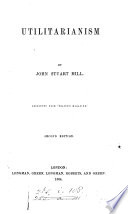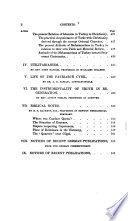 | 1861 - 882 sayfa
...another, merely as a pleasure, except its being greater in amount, there is but one possible answer. Of two pleasures, if there be one to which all or almost all who have experience of both give a decided preference, irrespective of any feeling of moral obligation to prefer... | |
 | 1863 - 532 sayfa
...employment of the highest faculties of humanity ; but of this he gives no other proof than the following : " Of two pleasures, if there be " one to which all, or almost all, who " have experience of both give a de" cided preference, irrespective of any " feeling of moral obligation to... | |
 | John Stuart Mill - 1863 - 120 sayfa
...another, merely as a pleasure, except its being greater in amount, there is but one possible answer. Of two pleasures, if there be one to which all or almost V(,yj; all who have experience of both give a decided preference, irrespective of any feeling of moral... | |
 | Charles Tennant - 1864 - 486 sayfa
...Mill's tu quoque arguments, ad kominem, may be found, pp. 29, 36, 39, 42, 43, 44, 77. He says, (p. 12) " Of two pleasures, if there be one to which all, or almost all, who have experience of both, give a decided preference, irrespective of any feeling of moral obligation to prefer... | |
 | John Stuart Mill - 1864 - 406 sayfa
...another, merely as a pleasure, except its being greater in amount, there is but one possible answer. Of two pleasures, if there be one to which all or almost all who have experience of both give a decided preference, irrespective of any feeling of moral obligation to prefer... | |
 | John Stuart Mill - 1864 - 108 sayfa
...another, merely as a pleasure, except its being greater in amount, there is but one possible answer. Of two pleasures, if there be one to which all or almost all who have experience of both give a decided preference, irrespective of any feeling of moral obligation to prefer... | |
 | Book, H. A. - 1865 - 184 sayfa
...the failings, nay, the faults and crimes of mankind with a brother's eye. BURNS. THE SUMMUM BONUM. Of two pleasures, if there be one to which all or almost all who have experience of both give a decided preference, irrespective of anyfeeling of moral obligation to prefer... | |
 | 1866 - 778 sayfa
...another, merely as a pleasure, except its being greater in amount, there is but one possible answer : Of two pleasures, if there be one to which all, or almost all, who have expericnoe of both give a decided preference, irrespective of any feeling of moral obligation to prefer... | |
 | 1866 - 726 sayfa
...another, merely as a pleasure, except its being greater in amount, there is but one possible answer : Of two pleasures, if there be one to which all, or almost all, who have experience of both give a decided preference, irrespective of any feeling of moral obligation to prefer... | |
 | 1866 - 732 sayfa
...another, merely as a pleasure, except its being greater in amount, there is but one possible answer : Qf two pleasures, if there be one to which all, or almost all, who have experience of both give a decided preference, irrespective of any feeling of moral obSgation to prefer... | |
| |